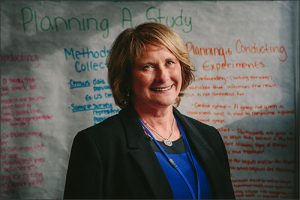Education ‘Leaders to Learn From’ Brought Business Lessons to School
A background in business gave two of Education Week‘s 2017 Leaders to Learn From an unconventional perspective on education, as they rose through the ranks of K-12 districts.
Patricia Deklotz, the superintendent of the Kettle Moraine, Wisc. district, became a teacher after two decades in the world of financial software development. She found the world of education somewhat confounding.

(Photo by Alyssa Schukar for Education Week)
“When I stepped into my first classroom, I was in awe of my teacher colleagues,” said Deklotz, who began as a physical science teacher and was honored last month by Education Week for her leadership in innovation. She was impressed with educators’ “wealth of knowledge” and the fact that 70 percent held master’s degrees. “But I was also awestruck by the isolation of teachers…and the lack of collaboration or problem-solving in the structure of our educational process.”
Joseph Williams, the executive director of technology at the Perris Union High School District in Perris, Calif., spent the first part of his career in demolition, before transitioning to teaching. Recognized by Education Week for his leadership in educational technology, Williams had become a project manager before stepping into a classroom.
On his major demolition jobs, Williams was accustomed to tackling issues with an “all-hands-on-deck approach.”

(Photo by Sandy Huffaker for Education Week)
“In problem solving, we would suspend hierarchy,” said Williams, who worked with various foremen on a job to accomplish the demolition goal. “No one trade had more sway than another. No foreman would look down at the apprentice when we were solving problems.” Once a solution had been arrived at, “we would regroup and establish some command and control in what we were going to do,” he said.
Williams said he has a reputation for speaking his mind, regardless of hierarchy in education, too, in the effort to solve problems. His pre-classroom experience showed him the power of “leading from the field,” and now he prides himself in “leading from the classroom.” He sees supporting teachers as his mission, because “they’re the troops in the field, and they’re doing the hard work.”
Deklotz, who had been a manager of technical support, a systems analyst, and a consultant, was accustomed to a team approach to tackling challenges, too. That’s what she has deployed for schools—first when she and other science teachers met to talk about lesson planning once a week, and later as an administrator leading a journey of personalized learning in a district that had been told it must “transform” with no other direction, just as its budget was being cut $1 million.
Relying partly on the software development approach she was accustomed to, Deklotz helped organize a team to study the issue, and they worked on it together. Ultimately, Kettle Moraine became a leader in personalized learning, and Deklotz recommends setting clear goals and monitoring 100-day cycles.
Perspectives on Business From ‘Inside Education’
Now that they’re on the other side of the business/education divide, Deklotz and Williams have views on how businesses should interact with schools based on their knowledge of both.
Williams said once at a well-known technology conference organized by the International Society for Technology in Education, or ISTE, a vendor “had the nerve” to invite educators to step inside a human-sized, plexiglass “money grabbing” booth, with a fan blowing loose cash around. The educator could keep the amount of money he could grab and hold onto until a timer went off. Besides finding it insulting, Williams said it could be a liability to an educator’s career. “Imagine if the taxpayers saw that,” he said.
At events like ISTE, Williams said he rarely spends time on the vendor floor. Rather, he takes private meetings with company representatives he’s already working with and “just talks to them.” Or, Williams meets new connections he has identified among “people who look like they’re doing the hard work—sponsoring a presentation at a conference, or sponsoring an educator as a speaker.”
Williams said he isn’t looking for vendors, but rather partners, where a company is willing to sit and listen to his district’s philosophy of education, showing a willingness to “understand our structure and what we’re doing.”
Workplace Experiences for Career Preparation
Deklotz said educators are looking for business partners who are willing to provide workplace experiences to students in schools close to their offices and manufacturing facilities.
With so much attention being paid across the nation to career preparation and college- and career-readiness, Deklotz said her question to businesses would be, “How can you actively engage in the schools near you?”
At Kettle Moraine’s High School of Health Sciences, for instance, students can learn through partnerships with a medical center and a medical college. In this program, high school students have the option of earning nursing and emergency medical technician certifications, studying literacy through science, and learning biology through exploration of human cadavers.
While businesses offering internships are most helpful—like one of her students’ ability work in the Milwaukee mayor’s office during the school day—opportunities to job shadow are also beneficial, Deklotz explained.
“Nothing makes a student more ready than immersion in a workplace experience,” she said. “We want them to have that understanding before they start investing their money” in post-secondary education.
See also:
